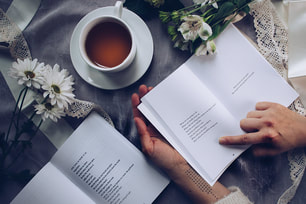|
by Sean Wolff
0 Comments
by Skyla Everwine  Photo by Jo Szczepanska on Unsplash Photo by Jo Szczepanska on Unsplash The most punk-rock thing I did this semester was stand in line at a UPS and try not to cry. It wasn’t the basement shows or broken guitar strings, but being at UPS at 4 p.m. on a Tuesday. I had but one task: to print nine pages, double-sided and in color. And then do that until 50 more times. It was the fourth or fifth printer I had gone to in order to print the zine I was making. I had learned that commercial printers were hellish portals to untamable frustrations, and that making the project for my Self-Publishing course with Dr. Jason Luther was far more difficult than it needed to be. I had turned what could have been a single page mini-zine into 36 pages of digital and hand-collaged interviews. by Emily Nolan  The old saying attributed to Lucille Ball that “comedy can’t be taught, you either got it or you don’t” is outdated, to say the least. It’s clear that a lot has changed since the I Love Lucy era. In the past decade, comedy has started to creep its way into the world of research and academia. There has been extensive research on the benefits of comedy, the reasons comedy makes people laugh, and the most effective structure of jokes, and comedic storytelling. Comedy or the act of laughing has been proven to stimulate your organs due to an increase of oxygen-rich air coming into your body, improve your immune system, and lessen feelings of anxiety or depression. While humor may not cure every ailment, the idea that laughter is the best medicine is not too far-fetched. Comedy can also be looked at as a vital tool in the classroom, as it can act as a key instrument in explaining complicated issues and ideas, it can lead to further retention from students.  by Amanda Spadel I didn’t always enjoy reading poetry the way I do now. There was a point in time when all I was interested in reading was fiction novels--especially when I first started having an interest in reading stories as a kid. Series such as Goosebumps, A Series of Unfortunate Events, and Harry Potter intrigued my initial interest in reading fiction for young adults—particularly suspense and science fiction stories. But in recent years, I’ve become a frequent poetry reader too. Actually, I’ve decided that poetry holds the same meaningful impact that longer stories do, if not more. In my opinion, the meaning in poetry can hold even more weight to young readers, especially if they don’t already avidly read. I’m not talking about introducing more traditional poems to young readers and have them relive the high school torment of figuring out a Shakespearean sonnet. Young readers should read more contemporary poetry because it’s current, most likely more relevant to their lives, and more importantly, a lot of contemporary poems seem more personal and transferable to audiences in today’s world where we are all pressed for time. by Mark Krupinski  “Anything and everything can be art!” is, I feel, a deceptively sinister phrase. You could substitute the rather generic “art” in this situation with your medium of choice, be it poetry, film, literature, or what have you, and the situation remains unchanged. It seems innocuous at first, even encouraging. Anything can be art; no matter how lost you may feel, no matter what vision you lack, your expression has merit. You exist and you are valid. As someone who has spent more time than perhaps he’d like to admit pacing fretfully to and fro, hyperventilating into a McDonald’s bag because the words don’t sound the way they’re supposed to, I understand. Writing is a painful, clumsy, often fruitless task, so positive affirmation is as valuable as it is rare. But there’s a danger in creating that sense of comfort, tossing standards by the wayside in favor of blind positivity and confidence. The idea that everything, every single careless, thoughtless, witless, messy, wishy-washy, meandering, pointless thing is art gives me pause. |
Archives
July 2024
Categories
All
|
|
Glassworks is a publication of Rowan University's Master of Arts in Writing 260 Victoria Street • Glassboro, New Jersey 08028 [email protected] |
All Content on this Site (c) 2024 Glassworks
|


 RSS Feed
RSS Feed
